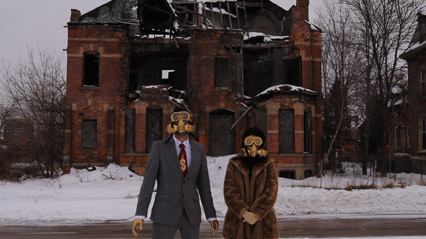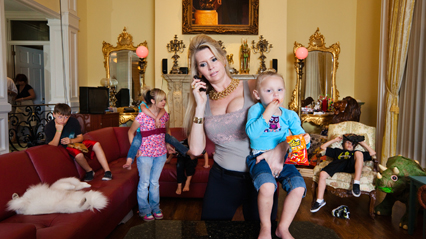

By Kim Voynar Voynar@moviecitynews.com
Sundance Docs Roundup: Detropia, Queen of Versailles, and Ethel
Detropia
Sundance vets Rachel Grady and Heidi Ewing were back this year with Detropia, a look at a city that’s gone from being the fastest growing city in the US to one of the most rapidly declining. Detropia has a palpable opinion about its subject matter (Ewing grew up just outside Detroit), and the filmmaker’s views on the deterioration of Detroit and the reasons it’s happening are made pretty clear. They’re not offering up ideas on how to fix Detroit, they’re holding up this visually compelling, artfully constructed, beautifully shot film about a city falling apart before the lens of their camera. And somehow amidst the ruin, the despair, and the wrecking balls, the residents sticking it out still have spirit and a determination to bring Detroit back from the brink of disaster.
Working from a thesis of “as Detroit goes, so goes the nation,” Grady and Ewing forego their typically structured style for a more free-flowing approach, where painterly visuals are used to tell the story, the people interviewed acting as an enraged Greek chorus commenting on what we’re seeing rather than an collection of individual voices meekly complaining. Grady and Ewing use Detroit as a microcosm case study of what happens to a city when a declining economy, corporate greed and job outsourcing strip away the livelihoods of tens of thousands of workers, effectively cutting the beating heart out of a once-thriving city.
One of the people interviewed by the filmmakers refers to Detroit as the proverbial canary in a coal mine, and it’s clear the filmmakers are sending an urgent message here: Look at what’s happened to this once great city. This could be your city, your hometown next, because the problems that plague Detroit are hardly endemic to this one place. Even as they paint a bleak picture of a city on the verge of complete flatline, though, Grady and Ewing keep a finger on the pulse that’s still keeping the city together: the resilient residents, pissed off at the auto companies for taking away the jobs that built their city to begin with, but determined not to give in; the politicians desperately struggling to figure it all out before the state steps in and takes over completely; and the artists inspired to capture this moment in history on canvases, through songs, through written and spoken word.
Queen of Versailles
One of the surprises of this year’s Sundance was Queen of Versailles, Lauren Greenfield’s “rags to riches to rags” documentary about David and Jackie Siegel, who had more money than they knew what to do with, and all the power and freedom that goes along with that – until the 2008 economic downturn delivered a reality smackdown that neither of them was prepared for.
The vividly symbolic representation of the Siegel’s spectacular success and failure is Versailles, the 90,000 square foot house the couple were building in Florida (their current house, at only 27,000 or so square feet, being a little too small for their abundant possessions). Versailles was only halfway built when the economic bubble burst, causing David Siegel’s wildly successful condo timeshare business to deflate, threatening the company’s new showcase towers in Las Vegas and forcing thousands of layoffs within the company. Although the land and house were paid for, Siegel took out a mortgage against the property to keep his business going, and with his hard-fought business collapsing around him like a flimsy house of cards, Siegel takes to retreating more and more to solitude in his room, where he surrounds himself, monk-like, with stacks and stacks of business papers, desperately struggling to keep everything afloat.
Jackie, meanwhile, still has eight kids to raise – a perfectly reasonable number of kids when your husband is super-rich and you can afford a pack of nannies and a household staff of 19 to keep everything clean and functioning, but a little overwhelming when you don’t have the support to which you were accustomed. With their belts tightened, though, the Siegels have to face the reality of needing to make some serious cutbacks, reducing the household staff down to just a couple of nannies, switching their kids from private to public schools, selling off the private jets and whatever other big-ticket items they can.
A blond beauty queen smart enough to graduate from RIT before she met and married David Siegel, Jackie remains the primary focus throughout the film – a great call on Greenfield’s part, because while in the first half of the film you can’t help but just roll your eyes at the family’s extravagant lifestyle, by the second half Jackie, desperately trying to hold things together for her family, painting a strained smile on her face as she tries to offer support and love to a husband too far lost in depression and gloom to do more than half-heartedly swat her and their children away, becomes a much more sympathetic character.
David Siegel is cocky and arrogant at the beginning of the film, but even then we see a glimpse of his insecurities when he wonders aloud what his much younger, beauty queen wife sees in him. We see Jackie’s insecurities, too, as she nervously half-jokes that David had told her that once she turned 40, he was going to replace her with two 20-year-olds (ah, rich old white guy humor, heh heh, what a kidder). And we see both of their insecurities refracted hugely through their hoarding of wealth and possessions; it’s not just the 90,000 square foot house, it’s the eight kids, and the however-many dogs, and a Christmas shopping trip to Wal-Mart (multiple carts worth) in which Jackie throws random toys in the cart, barely looking at them.
The childrens’ Filipino nanny is used to great effect as a part of Greenfield’s storytelling, as we learn that she left behind her own children back in her home country to come to the US to work as a nanny to support them. She sends her family all that she makes, but hasn’t seen her own kids in many years; instead, her young charges have become the surrogates upon whom she’s lavished her love. And there’s a poignant scene where she shows the little house in which she lives – a small playhouse that belonged to the twins that they no longer use, that speaks volumes about status and class in the era of the 99% versus the 1%.
Ethel
Ethel, Rory Kennedy’s documentary homage to her mother, Ethel Kennedy (widow of Robert F. Kennedy) is a warm, lovely portrait of a woman who’s passion for life and philosophic value system supported her husband in his political aspirations, and the 11 children she was left to raise when he was killed. The undeniable poignancy of the film is derived, in large part, by Rory Kennedy’s search to understand her father, a legend and political hero who was killed six months before she was born. As the only one of her large pack of siblings not to have any memory at all of her father, one has to imagine that she grew up with this enormous hole in her life where her father should have been, and that a lifetime of being referred to as the daughter of RFK had its impact on her. But it’s Rory’s mother, Ethel, who’s the heartbeat and pulse of this story, as she was in the lives of Rory and her siblings, and structurally, she and her filmmaking team do a fantastic job arcing the story of this fiercely loyal, independent, fun-spirited woman who we don’t know all that much about, against the familiar historical events surrounding Jack and Bobby Kennedy.
There’s a particularly poignant moment in the film when Rory asks her mother about the day RFK died. Immediately, her face is etched with buried grief, her eyes fill with a well of deep, long-suffering sorrow, and she tells her daughter simply, I don’t want to talk about that. It says all we need to know. Her daughter focuses instead on the woman who refused to wallow in grief and despair when her husband died, his tragic death following that of his brother’s and Martin Luther King, Jr.’s such a pivotal point in our nation’s history, holding her head up and turning her focus to raising his children to be the kind of adults he would have been proud of.
This is an engaging, compelling film, filled with abundant never-before-seen home video footage of what Bobby and Ethel’s life was like, with their brood of happy kids tromping around their farm, their mother forever thinking of interesting and daring things for them to do, and their staunch Catholic insistence that their children not only appreciate all the privilege that comes with being born a Kennedy, but that they learn about the problems in the world and put their minds and their social and political power to use in finding ways to be a part of the solution.











![Robert F. Kennedy [& Family];Joseph P. II Kennedy](http://moviecitynews.com/wp-content/uploads/2012/01/ethel2.jpg)





